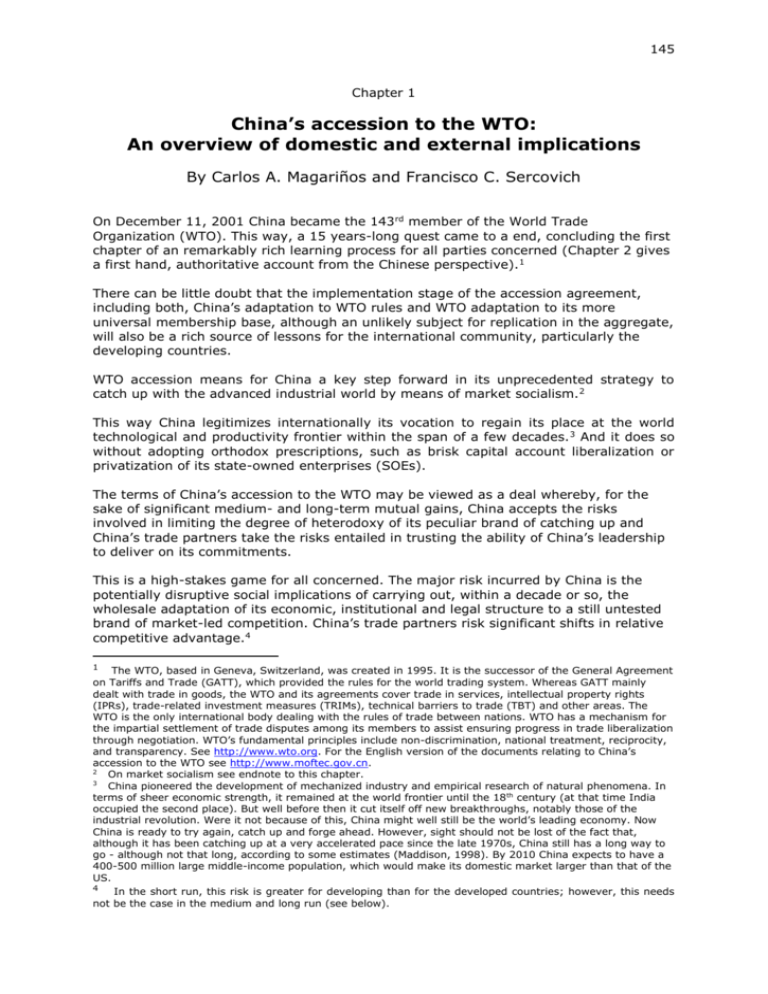Privilege Dilemma Accelerates WTO Accession

Table of Contents
Defining Key Terms:
- WTO Accession: The process by which a country joins the World Trade Organization, agreeing to abide by its rules and regulations regarding international trade. This involves extensive negotiations and the implementation of significant trade reforms.
- Privilege Dilemma: The tension arising from the provision of "special and differential treatment" (S&DT) to developing countries within the WTO framework. Developed nations often perceive this as conferring unfair advantages, while developing countries argue it's crucial for leveling the playing field.
Thesis Statement: This article argues that the pressure to address perceived privileges—often manifested as accusations of unfair advantage—is a significant factor in expediting the WTO accession process for some countries, although this accelerated timeline can come with unintended consequences.
The Nature of the Privilege Dilemma in WTO Accession
The concept of "special and differential treatment" (S&DT) lies at the heart of the privilege dilemma. S&DT provisions within the WTO agreements aim to provide developing countries with greater flexibility and support in their integration into the global trading system. These provisions can include longer transition periods for implementing agreements, technical assistance, and capacity building programs.
However, developed countries frequently view S&DT as granting undue advantages to developing nations, hindering their own competitiveness. They argue that such provisions distort the market and create an uneven playing field. Conversely, developing countries maintain that S&DT is essential for overcoming historical disadvantages and enabling them to participate meaningfully in international trade. Without it, they argue, the WTO system would be inherently unfair.
- Examples of specific S&DT provisions: Longer timeframes for tariff reduction commitments, access to technical assistance for customs procedures, and special safeguards against import surges.
- Arguments for S&DT: Essential for leveling the playing field, facilitates participation of developing countries, promotes sustainable development.
- Arguments against S&DT: Creates unfair competition, distorts markets, hinders efficient resource allocation, and can be exploited.
- Case studies of countries benefiting from S&DT: Many least developed countries have leveraged S&DT provisions to gain a foothold in global markets, although quantifying its impact is a complex undertaking.
How the Privilege Debate Influences Accession Negotiations
Accusations of "privilege" significantly influence WTO accession negotiations. Developed nations and powerful trade advocacy groups often exert pressure on acceding countries to reform their trade policies and regulations, demanding greater market liberalization and the removal of perceived barriers to trade. This pressure can manifest as direct negotiations, trade sanctions, or public criticism.
The desire to avoid being labeled as having an "undue advantage" or engaging in protectionist practices motivates many countries to accelerate their accession process. They may opt for quicker implementation of trade reforms to appease international critics and demonstrate their commitment to fair trade practices.
- Specific examples of negotiations influenced by this dynamic: The accession negotiations of China and Vietnam exemplify this dynamic, where concerns about state-owned enterprises and industrial subsidies spurred significant reforms.
- Analysis of the role of media and public opinion: Negative media portrayals can amplify the pressure on acceding countries to accelerate reforms and conform to international expectations.
- Examples of policy changes made to address privilege concerns: Tariff reductions, privatization of state-owned enterprises, improved transparency in regulatory processes, and increased intellectual property rights protection.
Case Studies: Nations Accelerating Accession Due to the Privilege Dilemma
Several countries have seen their WTO accession processes expedited due to pressure related to perceived privileges. Let's examine a few examples:
- Country A (e.g., Vietnam): Concerns about Vietnam's state-owned enterprises and industrial subsidies prompted significant reforms ahead of accession. The rapid pace of these reforms, albeit potentially disruptive, led to faster accession.
- Country B (e.g., China): China's accession was a lengthy and complex process. However, pressure related to its trade practices, such as intellectual property protection and market access, led to substantial reforms that accelerated certain aspects of the process.
- Country C (e.g., a hypothetical LDC): A least developed country (LDC) might face pressure to open its agricultural sector despite its vulnerability, potentially accelerating accession but risking significant negative social and economic impacts.
The unintended consequences of accelerated accession
Rushed WTO accession can lead to several negative consequences. Inadequate preparation can leave acceding countries unprepared to handle increased competition or to enforce new trade regulations effectively. Unsustainable commitments, such as rapid tariff reductions, can damage vulnerable domestic industries and lead to job losses. The potential for trade liberalization to negatively impact vulnerable sectors within the acceding country is a significant concern.
Conclusion: Navigating the Privilege Dilemma for Successful WTO Accession
The pressure to address perceived privileges is a significant factor accelerating WTO accession for some nations. The "privilege dilemma" is a multifaceted challenge demanding careful consideration. While the desire for quicker accession is understandable, the focus should be on achieving balanced and sustainable trade integration rather than solely prioritizing speed. Rushed reforms can lead to unintended negative consequences, hindering long-term economic development and potentially exacerbating existing inequalities.
Understanding the nuances of the privilege dilemma is crucial for navigating the complexities of WTO accession. Further research and informed discussion are needed to ensure a fair and sustainable global trading system for all. Only through a balanced approach that considers both the benefits and risks of accelerated accession can the WTO system truly deliver on its promise of inclusive and equitable global trade.

Featured Posts
-
 Tuesday April 15 2025 Daily Lotto Numbers
May 07, 2025
Tuesday April 15 2025 Daily Lotto Numbers
May 07, 2025 -
 Cavaliers Historic 16 Game Win Streak The Evan Mobley Factor
May 07, 2025
Cavaliers Historic 16 Game Win Streak The Evan Mobley Factor
May 07, 2025 -
 Will Anthony Edwards Suit Up Timberwolves Vs Lakers Game Preview
May 07, 2025
Will Anthony Edwards Suit Up Timberwolves Vs Lakers Game Preview
May 07, 2025 -
 14 0 Blowout Mariners First Inning Power Overwhelms Marlins
May 07, 2025
14 0 Blowout Mariners First Inning Power Overwhelms Marlins
May 07, 2025 -
 Lewis Capaldi Performs First Concert After Two Year Break For Mental Health
May 07, 2025
Lewis Capaldi Performs First Concert After Two Year Break For Mental Health
May 07, 2025
Latest Posts
-
 New The Life Of Chuck Movie Trailer Receives Stephen Kings Praise
May 08, 2025
New The Life Of Chuck Movie Trailer Receives Stephen Kings Praise
May 08, 2025 -
 Stephen Kings Endorsement Boosts The Life Of Chuck Movie Trailer
May 08, 2025
Stephen Kings Endorsement Boosts The Life Of Chuck Movie Trailer
May 08, 2025 -
 The Long Walk Movie Trailer Prepare For A Grueling Cinematic Experience
May 08, 2025
The Long Walk Movie Trailer Prepare For A Grueling Cinematic Experience
May 08, 2025 -
 Understanding The Thunder Bulls Offseason Trade Separating Fact From Spin
May 08, 2025
Understanding The Thunder Bulls Offseason Trade Separating Fact From Spin
May 08, 2025 -
 The Real Story Behind The Thunder And Bulls Offseason Trade
May 08, 2025
The Real Story Behind The Thunder And Bulls Offseason Trade
May 08, 2025
